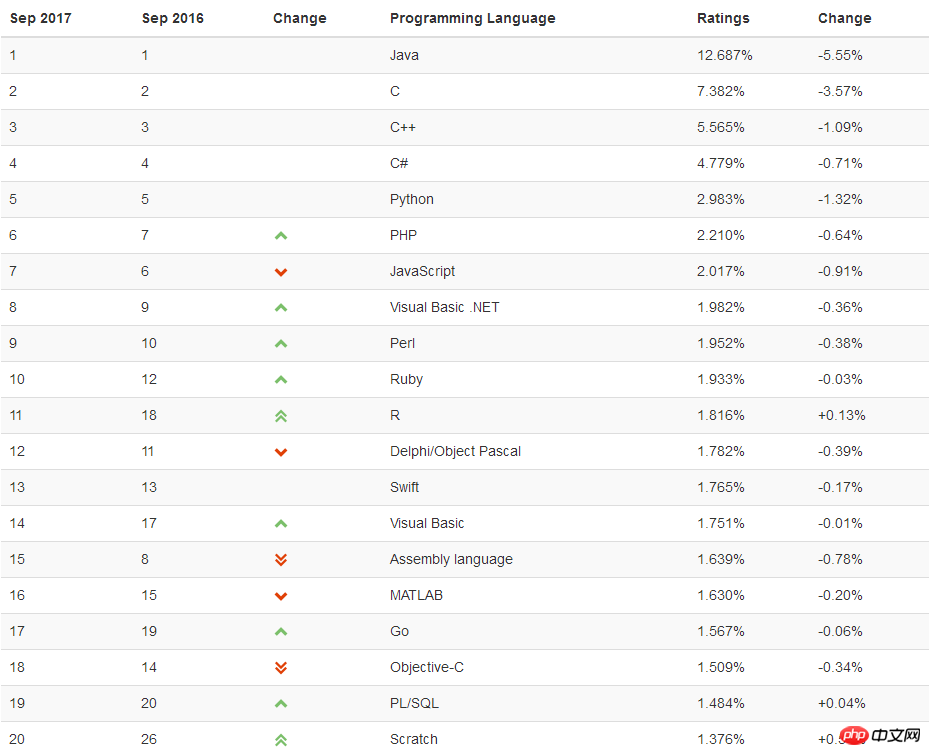The top three on the TIOBE list have not changed for more than 15 years. The three most used languages, Java, C, and C++, are the same as in 2001, occupying the first, second, and third positions on the list without any suspense. C# and Python were once considered to have the greatest potential to become the most popular languages, but they have yet to achieve this goal. C# is not ranked in the top three because its usage in non-Windows areas is still very low. On the other hand, since Python is dynamically typed, this feature prevents large software and critical software systems from using it. Having said that, the gap between the big three programming languages and the rest is quickly closing. But the top three competitors are also losing market share, so we don’t know what the future trend will be. Applications written in a single language are becoming increasingly rare. More and more languages are becoming more popular under the influence of TIOBE list. So, exciting times are ahead as we see which programming languages will be the winners in the coming years.


| Position | Programming Language | Ratings |
|---|---|---|
| 21 | SAS | 1.37% |
| 22 | Dart | 1.31% |
| 23 | D | 1.10% |
| 24 | Transact-SQL | 1.08% |
| 25 | ABAP | 1.07% |
| 26 | COBOL | 1.06% |
| 27 | (Visual) FoxPro | 0.93% |
| 28 | Scala | 0.92% |
| 29 | Fortran | 0.88% |
| 30 | Ada | 0.79% |
| 31 | Crystal | 0.76% |
| 32 | Erlang | 0.73% |
| 33 | Lisp | 0.69% |
| 34 | Awk | 0.66% |
| 35 | Lua | 0.65% |
| 36 | VBScript | 0.62% |
| 37 | F# | 0.61% |
| 38 | Alice | 0.60% |
| 39 | Prolog | 0.60% |
| 40 | LabVIEW | 0.54% |
| 41 | Logo | 0.51% |
| 42 | VHDL | 0.51% |
| 43 | Hack | 0.49% |
| 44 | Ladder Logic | 0.47% |
| 45 | Verilog | 0.46% |
| 46 | Apex | 0.44% |
| 47 | Julia | 0.44% |
| 48 | ML | 0.43% |
| 49 | Rust | 0.42% |
| 50 | PowerShell | 0.40% |
The 51st to 100th programming languages are ranked as follows. Due to the small numerical difference between them, they are not ranked in order:
4th Dimension/4D, ABC, ActionScript, APL, AutoLISP, Bash, bc, Bourne shell, C shell, CFML, CL (OS/400), Clipper, Clojure, Common Lisp, Elixir, Elm, Euphoria, Forth, Groovy, Haskell, Icon, IDL, Inform, Io, J, Korn shell, Kotlin, Magic, Maple, MOO , MQL4, MUMPS, NATURAL, NXT-G, OCaml, OpenCL, OpenEdge ABL, Oz, PL/I, PostScript, Q, REXX, Ring, RPG (OS/400), Scheme, Smalltalk, SPARK, SPSS, Stata, Tcl
The following rankings are taken from the 12-month average.
| Programming Language | 2017 | 2012 | 2007 | 2002 | 1997 | 1992 | 1987 |
|---|---|---|---|---|---|---|---|
| Java | 1 | 2 | 1 | 1 | 15 | - | - |
| C | 2 | 1 | 2 | 2 | 1 | 1 | 1 |
| C++ | 3 | 3 | 3 | 3 | 2 | 2 | 5 |
| C# | 4 | 4 | 7 | 13 | - | - | - |
| Python | 5 | 7 | 6 | 11 | 27 | - | - |
| Visual Basic .NET | 6 | 17 | - | - | - | - | - |
| PHP | 7 | 6 | 4 | 5 | - | - | - |
| JavaScript | 8 | 9 | 8 | 7 | 23 | - | - |
| Perl | 9 | 8 | 5 | 4 | 4 | 10 | - |
| Assembly language | 10 | - | - | - | - | - | - |
| COBOL | 25 | 28 | 17 | 9 | 3 | 9 | 9 |
| Lisp | 31 | 12 | 15 | 12 | 9 | 4 | 2 |
| Prolog | 32 | 31 | 26 | 16 | 20 | 11 | 3 |
| Pascal | 114 | 15 | 21 | 97 | 8 | 3 | 4 |
Programming Language of the Year is awarded to the highest-rated programming language of the year:

[Description] TIOBE Programming Language Community Ranking is an indicator of programming language popularity trends , updated monthly, this ranking is based on the number of experienced programmers, courses and third-party vendors on the Internet. Rankings are calculated using well-known search engines such as Google, MSN, Yahoo!, Wikipedia, YouTube, Baidu, etc.
Please note that this ranking only reflects the popularity of a certain programming language. It does not indicate whether a programming language is good or not, or how much code is written in a language.
This ranking can be used to test whether your programming skills are keeping pace with the times, and can also be used as a basis for language selection when developing new systems. The detailed definition of the rankings can be found here: https://www.tiobe.com/tiobe-index/




